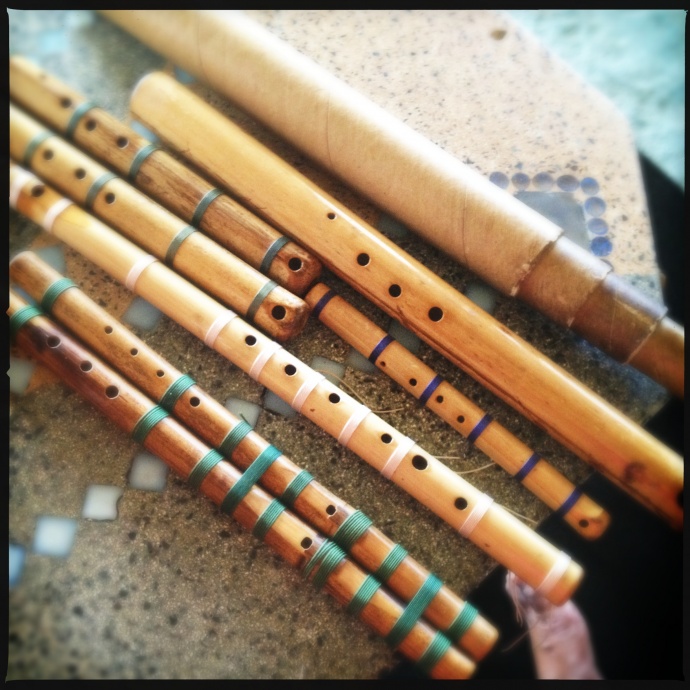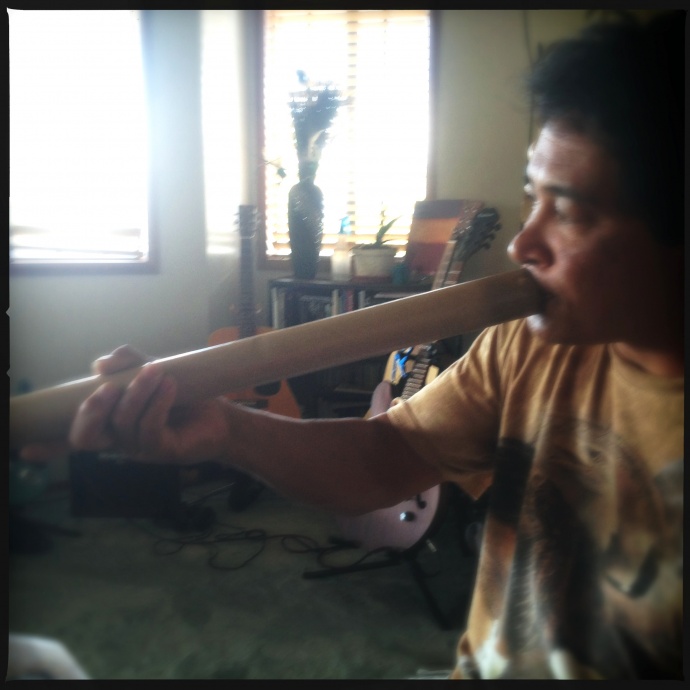In Memorium: Maui Artist Anthony Natividad
Vanessa Wolf is a Maui-based writer who intermittently laughed and cried while writing this piece.
By Vanessa Wolf
Local musician and Ulalena cast member Anthony Natividad died unexpectedly last Sunday, October 28th, a week and a half after this interview was conducted. He was an influential and beloved member of this community and will be missed.
A handmade traditional Hawaiian nose flute is placed beside each of your ears. You sit in a chair; your back to the musician.
“This is the voice of your ancestors,” Anthony Natividad tells you.
And it is.
Although earlier the melodies had seemed to be Native American, Hawaiian, Hindu and even at times even Peruvian, now – suddenly – the sound is notably Celtic.
As a few tears fall from your eyes, you wonder who or what this man really is and how on earth he is managing to conjure this hauntingly familiar music…and with his nose.
“The sound of the nose flute is played for souls…not just our own, but the souls of your ancestors and any ancestor in the area. I’m the vehicle for the flute to have a voice,” Natividad explains, and somehow this makes sense.
Anthony Natividad did not immediately recognize the nose flute as his calling.
He saw one for the first time in 1975 while in the fifth grade and attending leadership camp on Oahu.
“If you were pretty decent at school, you got to go to Camp Erdman on the North Shore. There we could go camping in actual cabins. The camp was run by Hawaiians and all the activities were Hawaiian activities: one was the nose flute.”
Uncle John Naone , who has since passed away, pulled the kids aside, picked up a nose flute he had made from bamboo, and played for them. “Watch me,” he instructed.
A minute later he stopped. “Okay, you guys saw that? Good.”
Naone explained that traditionally women play flutes with two holes and men play those with three. “However, I’ve only made ones with three holes, so pick one. It doesn’t matter. I’m going to let you practice for ten minutes. If I hear you talking about anything but the nose flute, I’m going to crack you on the head and call your parents.”
The children each took a flute and quickly found they couldn’t make a sound. They were given a second demonstration and opportunity to practice with the same results: no sound but for that of the air being ejected from their nostrils.
Natividad took the flute home and would pick it up from time to time. “I was intrigued by the thing for about two years after that,” he recounted. “I tried the same thing over and over again for two years and never made a sound; just air.”
Time passed and eventually that flute disappeared along with it.
Then, in June 1992, Natividad’s wife, Jamie, brought home an ocarina from Arizona. The ocarina is an ancient flute-like wind instrument, believed to be as much as 12,000 years old in its origins.
Natividad thought it was a pendant or some kind of jewelry, but his wife explained it was a flute.
“When I blew on it, that first sound was like ‘wow!’ I was hooked. My wife had to bear with me for four months as I learned.”
To hear him tell it, those early months were not exactly filled with melodic tunes. “For the first month and a half I sucked at the ocarina. I would practice in my car and away from home…at her request.”
His burgeoning love for the music he was making surprised him. “I never thought I’d be a musician at all. I wasn’t paying attention to music. My father in law – who was my band teacher in high school – can attest to that!”
A few years later, someone asked Natividad if he had ever heard of the Native American flute. The answer was no.
The music played for him that day was by R. Carlos Nakai, the Native American flute player of Navajo and Ute heritage.
Natividad heard the name and was reminded of his own heritage. “Carlos is a Filipino name. And Nakai? Hey, this sounds like a Filipino Japanese guy too!”
He went to his wife to ask if she’d heard of the Filipino-Japanese flute player, R. Carlos Nakai, and she informed him he was Native American. Not only that, but “I’ve been playing his music for years. You just never noticed.”
Natividad reflected on this memory. “I had never really noticed. I guess you’re ready for stuff when you’re ready.”
A series of experiences eventually led him back to the Hawaiian nose flute. From there, he began making them from bamboo…and any material that would accommodate his efforts.
Many cultures have flutes. “It is a very profound, sacred instrument.,” Natividad explained. “All flutes were used for ascension. The Native American flute was used for courtship. Krishna played the bansuri. The list goes on.”
Why is the Hawaiian flute played with the nose?
“The Hawaiians and many Polynesians believe the breath – the ha – is our essence. No words can be spoken through our nose. If our breath is our essence, we cannot lie about ourselves through our nose. If music is an expression of who we are, the nose flute is an instrument of sincerity and purity. We become a very clear tool and share part of who we are when we play.”
Anthony Natividad’s music shared who he was and touched many lives. He played not just for the living, and believed that the ancestors were among us at all times.
“We are never alone,” he often said.
One can only hope he does not leave us alone either, and that his kindness, spirituality, and true spirit of aloha live on.







_1768613517521.webp)


